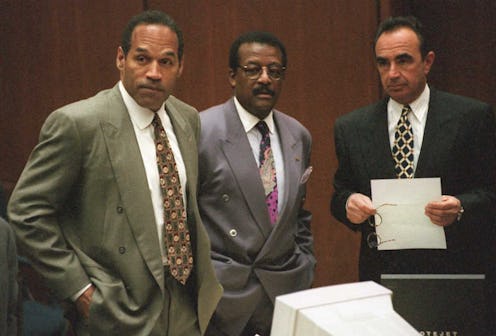News
Shapiro Says One Mistake Could Have Convicted O.J.
More than 20 years have gone by since the O.J. Simpson "trial of the century" was beamed into millions of homes, but you would never know it watching FX. On Tuesday night, a large number of people were once again transfixed by the verdict — or rather "The Verdict," the season finale of The People v. O.J. Simpson: American Crime Story. Once again, viewers saw O.J. acquitted thanks to his embattled defense team. One of them, Robert Shapiro, gave Barbara Walters an interview shortly after the Simpson murder trial wrapped up in real life.
Like the media at the time, much of the season has focused on the defense lawyer "dream team" and Simpson's first hire as defense attorney, Robert Shapiro. Shapiro enjoyed talking to the media, and ended up at odds with the main trial lawyer in the case, Johnnie Cochran. In the interview Shapiro gave Walters, he shed light on a number of issues surrounding the case, from his feud with Cochran (playing the race card "from the bottom of the deck") to his decision not to put Simpson on the stand. If Simpson had been put on the stand, Shapiro said, he most surely would have been found guilty.
Shapiro explained that Simpson was the "most active person" he had ever represented; that Simpson knew every aspect of the case, and initially wanted to testify. Shapiro claims that he stopped this:
Initially, it was my decision. O.J. always wanted to take the stand. Mr. Cochran and Mr. Bailey thought he should take the stand. If O.J. Simpson testified and made one mistake, he would be convicted. We couldn't take that chance. I couldn't take that chance, and that's what I advised him.
Walters asked him about the team's strategy, and if it changed. The series and media reports from the time show that race took an increasingly bigger role as the trial progressed. Shapiro claimed that the strategy was consistent from the get-go, before later admitting that their tactics shifted as they reached trial, especially as more lawyers — especially Cochran — joined the defense. Shapiro said that Cochran was hired for a combination of being a good lawyer and for being black.
Walters went on to bring up the "race card": "Mr. Shapiro, you said in the beginning that race would not be a determining part of this case so you would not play the race card. The race card was surely played." Shapiro agreed, although he said it was not his idea:
My position was always the same: That race would not and should not be a part of this case. I was wrong. Not only did we play the race card, we played it from the bottom of the deck.
Shapiro tried to spin the disagreement that was seen among the defense team:
There was a difference in the defense team and the strategic ways that things should be presented, and it's good. It's good because it leads to different points of view ... There was not animosity between myself and Mr. Cochran. There were serious differences of opinion, and still are.
That said, the differences of opinion were so big that Shapiro said he would not work with Cochran again. He claimed that using the race card was one of his biggest misgivings:
The difference on the racial issue. He believes everything in America is related to race. I do not.
And one of the biggest revelations, as shown in the show, was the fact that he tried on the infamous glove first, and knew that it wouldn't fit Simpson. He told Walters:
There was no chance. I walked into the walk-up and said, 'You're going to try on these gloves. They will not fit you.' He said, 'That's what I've been trying to tell you.'
The gloves did indeed seem a little too small on Simpson. Had there been a retrial, Shapiro would not have participated. He said that between the stress the trial put on his wife and "also the racial issue, the way it was brought up," he couldn't do it again. That said, it was an experience that he said he'd never forget. Neither will the 150 million Americans who watched O.J. get acquitted, or the millions more tuning in now.
